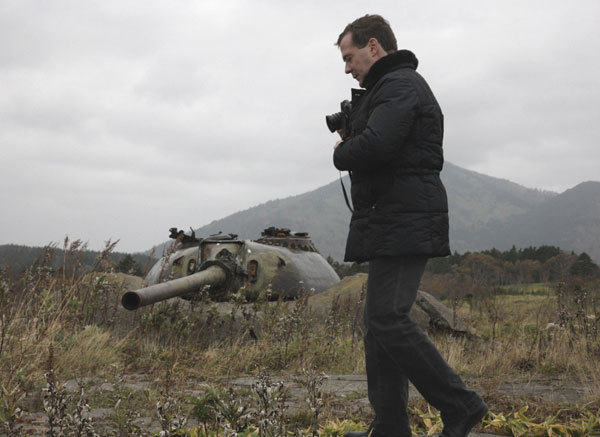Global General
Medvedev visits disputed island, draws Tokyo's ire
By Jay Alabaster (China Daily)
Updated: 2010-11-02 07:14
 |
Large Medium Small |
Russian stance firm as Japan expresses regrets

| Russian President Dmitry Medvedev walks past a Soviet-era tank during his visit to one of the Kuril Islands, a remote territory at the heart of a decades-long dispute with Tokyo, on Monday. [Photo/Agencies] |
TOKYO - Russia's president visited an island in the Pacific Ocean claimed by both Russia and Japan on Monday, triggering immediate protests from Tokyo.
President Dmitry Medvedev landed on Kunashiri Island, just off Japan's northern coast. It is part of a group of four islands claimed by both countries that Japan calls the Northern Territories and Russia calls the Southern Kurils.
Medvedev is the first Russian president to visit the island.
Japan's Foreign Ministry issued a statement soon after Medvedev's arrival that it opposed the visit, and would take appropriate measures. It called in Russia's ambassador in Tokyo to protest.
"We have never changed our position that the Northern Territories are a part of our territory and the visit is very regrettable," Japan's Prime Minister Naoto Kan told a session of parliament on Monday.
But Russia rejected Japan's protest.
"We don't understand the reaction of the Japanese side. The position of Russia on this question is being enforced and will not tolerate any change," a source at Russia's Foreign Ministry told Interfax on Monday.
The island chain stretches northeast from Japan's main northern island of Hokkaido to Russia's Kamchatka Peninsula. The island that Medvedev visited lies about 16 kilometers from Hokkaido.
The disputed islands have been under Russian control since the waning days of World War II. They have suffered neglect and the population has plummeted since the fall of the Soviet Union.
Commenting on general living standards in a meeting with local officials, Medvedev said: "We are beginning to improve the situation. New housing is being built. Social facilities are appearing. This is good because this is raising living standards. To a certain extent this allows people to hope that in a reasonable period of time their lives will be similar to those on the mainland: modern and successful."
He also visited a kindergarten, a geothermal power station and a fishery.
Medvedev, in a white coat over his suit, tried some local caviar, plunging a fork into a container of fresh orange roe and spreading it thinly on a slice of white bread.
"Delicious. Very tasty," he said.
He then bought a local smelt for 475 roubles ($15), and later used his last moments on the island to take photographs of the sea.
Medvedev said in September that he planned to visit the islands. At the time he described the islands as "a very important region in our country".
Japan also protested when Russian Foreign Minister Sergey Lavrov visited the islands in 2007. The dispute has prevented Tokyo and Moscow from signing a peace treaty to formally end hostilities from World War II.
Takehiko Yamamoto, a professor at Tokyo's Waseda University, said the visit was likely intended to reinforce to the Russian people Medvedev's commitment to push for development in its far east, while demonstrating to Japan that he intends to take a tough stance on disputed territory.
"I think this will make negotiations over the islands tougher," he said.
Xing Guangcheng, an expert on Russian studies at the Chinese Academy of Social Sciences, said the visit showed Moscow's strategic concern over the Far East, as well as a firm determination to safeguard its territorial integrity, which is "a typical move of a country that is regaining its clout".
But Shen Shishun, an analyst at the China Foundation for International Studies, noted that Japan has never given up its claim of sovereignty over the islands.
Therefore "negotiation remains the most effective and legitimate way to resolve the problems, no matter how long it will take", he said.
He Wei, Yu Yang, Reuters contributed to this story.
Associated Press




